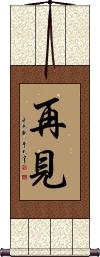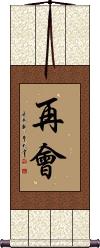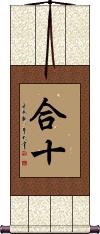Many custom options...
And formats...

Goodbye in Chinese / Japanese...
Buy a Goodbye calligraphy wall scroll here!
Personalize your custom “Goodbye” project by clicking the button next to your favorite “Goodbye” title below...
Goodbye
再見 is the most common “goodbye” in Mandarin Chinese.
It literally/directly translates, “again see” or more naturally, “See you again.” It's a lot like the English, “See you later.”
Theoretically, this can be used in Japanese, but in Japanese, it's seen as the Chinese way to say goodbye. It's like English people saying ciao! or ¡adiós!
This is a strange title for a wall scroll. I guess it’s best if you plan to put this by the door where people will see it when they leave your home or business.
Until We Meet Again
In Chinese, 再會 means to meet again, until we meet again, or goodbye.
In old Japanese, 再會 may be understood as a reunion or meeting again; though, in modern Japanese, you will see it written 再会.
Amitabha Buddha
This title can mean the Buddha of the Western paradise.
But it's more a chant that means “May the lord Buddha preserve us!” or “Merciful Buddha!.”
阿彌陀佛 is also a translation to Chinese, Japanese, and Korean for “Amitâbha Buddha.”
Asian Buddhists will often greet and say goodbye to each other with this phrase/chant/title.
Namaste - Greeting
The word namaste comes from Sanskrit and is a common greeting in the Hindi and Nepali languages exchanged by devout Hindu or Buddhist people in Southern Asia (especially India).
合十 is the Chinese form (not well-known in Japan) of this word which is used to describe a Buddhist (or Hindu) greeting with palms closed together prayerfully, generally at chest level. However, this selection of characters describes the act and is not a word spoken during the greeting. Words or a greeting are seldom spoken when two Buddhists meet. The greeting is silent and respectful but composed completely of body language.
Note that the greeting namaste and the act of placing palms together are used both as a hello and goodbye (like the word aloha in Hawaiian).
If you are looking for a welcoming hello and goodbye, you may want to consider gassho or a simple welcome.
Not the results for goodbye that you were looking for?
Below are some entries from our dictionary that may match your goodbye search...
| Characters If shown, 2nd row is Simp. Chinese |
Pronunciation Romanization |
Simple Dictionary Definition |
再會 再会 see styles |
zài huì zai4 hui4 tsai hui saie |
More info & calligraphy: Until We Meet Againmeet again |
再見 再见 see styles |
zài jiàn zai4 jian4 tsai chien shaichen; shaichien ツァイチェン; ツァイチエン |
More info & calligraphy: Goodbye(interjection) (kana only) good-bye (chi: zàijiàn); see you |
傷別 伤别 see styles |
shāng bié shang1 bie2 shang pieh |
sorrowful farewell; sad goodbye |
吻別 吻别 see styles |
wěn bié wen3 bie2 wen pieh |
to kiss goodbye |
告別 告别 see styles |
gào bié gao4 bie2 kao pieh kokubetsu こくべつ |
to leave; to part from; to bid farewell to; to say goodbye to (n,vs,vi) farewell; leave-taking |
告辭 告辞 see styles |
gào cí gao4 ci2 kao tz`u kao tzu |
to say goodbye; to take one's leave See: 告辞 |
失敬 see styles |
shī jìng shi1 jing4 shih ching shikkei / shikke しっけい |
to show disrespect; I'm awfully sorry – please forgive me (n,vs,adj-na) (1) rudeness; impoliteness; disrespect; impertinence; (noun/participle) (2) (masculine speech) leaving; going (on one's way); saying goodbye; (noun/participle) (3) taking without permission; stealing; pinching; pilfering; (interjection) (4) (masculine speech) my apologies; I must be going now; so long |
失礼 see styles |
shitsurei(p); shitsurai(ok); shichirai(ok) / shitsure(p); shitsurai(ok); shichirai(ok) しつれい(P); しつらい(ok); しちらい(ok) |
(n,vs,vi,adj-na) (1) (See 無礼) discourtesy; impoliteness; (expression) (2) (See 失礼します) excuse me; goodbye; (noun or participle which takes the aux. verb suru) (3) to leave; (noun or participle which takes the aux. verb suru) (4) (See 無礼) to be rude |
引別 引别 see styles |
yǐn bié yin3 bie2 yin pieh |
to leave; to say goodbye |
揮別 挥别 see styles |
huī bié hui1 bie2 hui pieh |
to wave goodbye; (fig.) to say goodbye to; to bid farewell to |
搖手 摇手 see styles |
yáo shǒu yao2 shou3 yao shou yō shu |
to wave the hand (to say goodbye, or in a negative gesture); crank handle trembling hands |
津送 see styles |
jīn sòng jin1 song4 chin sung shinsō |
To escort to the ferry, either the living to deliverance or more generally the dead; to bid goodbye (to a guest). |
話別 话别 see styles |
huà bié hua4 bie2 hua pieh |
to say a few parting words; to bid goodbye |
辭別 辞别 see styles |
cí bié ci2 bie2 tz`u pieh tzu pieh |
to bid farewell (to); to say goodbye (to) |
辭行 辞行 see styles |
cí xíng ci2 xing2 tz`u hsing tzu hsing |
to say goodbye; leave-taking; farewells |
送る see styles |
okuru おくる |
(transitive verb) (1) to send; to dispatch; to forward; to transmit; to ship; to remit; (transitive verb) (2) to see (someone) off; to escort; to accompany; to take; (transitive verb) (3) to bid farewell to (the departed); to say goodbye to; to bury; (transitive verb) (4) to spend (time); to pass; to lead (a life); to live; (transitive verb) (5) to pass (on, along); to advance (a runner); (transitive verb) (6) (See 送り仮名) to affix (okurigana) |
道別 道别 see styles |
dào bié dao4 bie2 tao pieh |
to say goodbye; to bid farewell; to pay a farewell call |
どうも see styles |
doumo / domo どうも |
(interjection) (1) (abbreviation) (See どうも有難う) thank you; thanks; (adverb) (2) much (thanks); very (sorry); quite (regret); (adverb) (3) quite; really; mostly; (adverb) (4) somehow; (adverb) (5) (See どうしても・1) in spite of oneself; try as one might; no matter how hard one may try (to, not to); (interjection) (6) greetings; hello; goodbye |
アデュー see styles |
adeuu / adeu アデュー |
(interjection) adieu (fre:); goodbye |
おさらば see styles |
osaraba おさらば |
(n,vs,vi) (1) saying goodbye (to); bidding farewell (to); breaking off (with); (interjection) (2) (polite language) (See さらば・1) farewell; goodbye; adieu |
お別れ会 see styles |
owakarekai おわかれかい |
(1) (See 偲ぶ会) gathering to remember a deceased person; memorial gathering; (2) (See 告別式・2) farewell party; goodbye party; send-off party |
グッバイ see styles |
gubbai グッバイ |
(expression) goodbye; goodby; good-by |
さいなら see styles |
sainara さいなら |
(interjection) (colloquialism) (See さようなら) goodbye; farewell; so long |
したっけ see styles |
shitakke したっけ |
(interjection) (1) (hob:) goodbye; see you later; bye-bye; (conjunction) (2) (hob:) (See そうしたら) then; and (then); in that case; if so |
じゃまた see styles |
shamata シャマタ |
(expression) (abbreviation) see you later (used in casual correspondence and conversation); goodbye; sincerely; (personal name) Shamata |
ではまた see styles |
dehamata ではまた |
(expression) (abbreviation) see you later (used in casual correspondence and conversation); goodbye; sincerely |
バイビー see styles |
baibii / baibi バイビー |
(interjection) (colloquialism) (See バイバイ・1) bye-bye; goodbye |
左様なら see styles |
sayounara(p); sayounara(sk); sayoonara(sk); sayoonara(sk) / sayonara(p); sayonara(sk); sayoonara(sk); sayoonara(sk) さようなら(P); サヨウナラ(sk); さよーなら(sk); サヨーナラ(sk) |
(interjection) (kana only) (See さよなら・1) farewell; adieu; goodbye; so long |
アディオス see styles |
adiosu アディオス |
(interjection) adios (spa: adiós); goodbye |
いざさらば see styles |
izasaraba いざさらば |
(expression) (1) (archaism) well then, (shall we); well then, (I'll); (expression) (2) goodbye |
Click here for more goodbye results from our dictionary
The following table may be helpful for those studying Chinese or Japanese...
| Title | Characters | Romaji (Romanized Japanese) | Various forms of Romanized Chinese | |
| Goodbye | 再見 再见 | shai chien / shaichien | zài jiàn / zai4 jian4 / zai jian / zaijian | tsai chien / tsaichien |
| Until We Meet Again | 再會 再会 | saie | zài huì / zai4 hui4 / zai hui / zaihui | tsai hui / tsaihui |
| Amitabha Buddha | 阿彌陀佛 阿弥陀佛 | amida butsu amidabutsu | ē mí tuó fó e1 mi2 tuo2 fo2 e mi tuo fo emituofo | o mi t`o fo omitofo o mi to fo |
| Namaste - Greeting | 合十 | gou juu / goujuu / go ju | hé shí / he2 shi2 / he shi / heshi | ho shih / hoshih |
| In some entries above you will see that characters have different versions above and below a line. In these cases, the characters above the line are Traditional Chinese, while the ones below are Simplified Chinese. | ||||
Successful Chinese Character and Japanese Kanji calligraphy searches within the last few hours...







